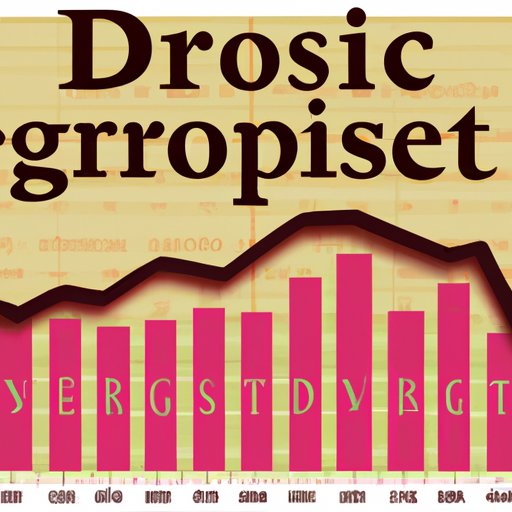Introduction
The Great Depression was a severe worldwide economic depression that occurred in the 1930s. It was the longest and most severe depression ever experienced by the industrialized Western world. The Great Depression began in 1929 and lasted until the late 1930s or early 1940s. It had devastating effects on virtually every sector of the economy and society, leading to widespread unemployment, poverty, and hunger, as well as social, economic, and political instability.
It is important to understand the causes of the Great Depression in order to prevent similar economic catastrophes from occurring in the future. This article will explore the various factors that contributed to the crisis and their impacts on the economy.

The Role of the Stock Market Crash
The stock market crash of 1929 marked the beginning of the Great Depression. The crash was caused by a combination of factors, including over-speculation, excessive margin buying, and a bubble in stock prices that had been artificially inflated. When the stock market crashed, investors panicked and sold off their stocks, resulting in a rapid decline in stock prices.
The impact of the stock market crash was far-reaching. Investment dropped sharply and consumer spending decreased significantly. Businesses stopped investing in new projects and laid off workers, which led to an increase in unemployment. Banks were also affected, as investors withdrew their deposits and banks had to liquidate assets to cover the withdrawals.
Impact of Bank Failures and Hoarding
The stock market crash was followed by a wave of bank failures due to the panic withdrawals of investors. Many banks were forced to close their doors, leaving depositors without their money. This resulted in a lack of confidence in the banking system, which further contributed to the economic downturn.
The situation was made worse by hoarding of gold and other assets. People began to hoard assets out of fear that they would lose their value, further reducing the amount of money in circulation. This led to deflation, which put even more pressure on businesses and consumers.
Decline in International Trade
The Great Depression was also caused by a decline in international trade. Nations around the world imposed tariffs and protectionist policies to protect their own industries. This led to a decrease in global trade, which in turn reduced demand for goods and services and put further downward pressure on the economy.
The decline in international trade had a particularly devastating effect on countries that relied heavily on exports for income. These countries saw their incomes decline sharply as demand for their products declined.
Role of Government Policies
Government policies also played a role in the Great Depression. Governments adopted contractionary fiscal policies, such as high interest rates, tax increases, and budget cuts, in an attempt to balance their budgets. These policies had the unintended consequence of further reducing investment and consumer spending, putting even more downward pressure on the economy.
In addition, governments adopted expansionary monetary policies, such as printing more money and lowering interest rates, in an attempt to stimulate the economy. However, these policies did not have the desired effect, as businesses and consumers still lacked the confidence to invest and spend.
Inequality of Wealth Distribution
The concentration of wealth in fewer hands also contributed to the crisis. As the wealthy held a larger share of the nation’s wealth, they were less likely to invest or spend, further reducing economic activity.
The situation was made worse by the unequal distribution of income. While the wealthy continued to accumulate more wealth, those at the lower end of the income scale were increasingly unable to make ends meet, further reducing consumer spending and investment.
Drought Conditions
Drought conditions in the United States also contributed to the crisis. The combination of high temperatures and low precipitation led to a dramatic reduction in crop yields, making it difficult for farmers to make a living. This in turn led to a decrease in rural spending, further reducing economic activity.
The drought conditions also led to an increase in dust storms, which spread across the country and caused health problems for many people. This further reduced economic activity as people had to take time off work to seek medical attention.

Overproduction of Goods and Services
Finally, the Great Depression was caused by the overproduction of goods and services. Companies were producing more than what consumers were willing to buy, resulting in excess inventories and unsold goods. This led to a decrease in production and employment, as companies had to lay off workers to reduce costs.
The overproduction of goods and services also led to deflation, as companies reduced their prices in an attempt to sell their products. This further reduced consumer spending, as people were reluctant to buy when they expected prices to continue to fall.
Conclusion
The Great Depression was caused by a combination of factors, such as the stock market crash, bank failures, international trade decline, government policies, wealth inequality, drought conditions, and overproduction. These factors had a devastating effect on the economy, leading to widespread unemployment, poverty, and social unrest.
Understanding the causes of the Great Depression can help us better prepare for future economic crises. Governments should focus on promoting inclusive economic growth, reducing inequality, and avoiding contractionary fiscal and monetary policies.
(Note: Is this article not meeting your expectations? Do you have knowledge or insights to share? Unlock new opportunities and expand your reach by joining our authors team. Click Registration to join us and share your expertise with our readers.)
